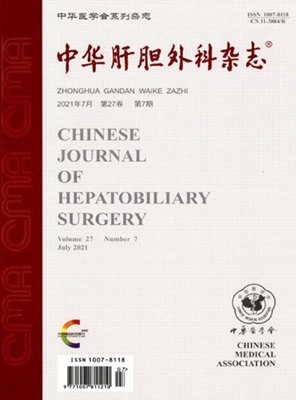Effect of insulin-like growth factor-I receptor on radiosensitivity of HepG2 cells
Q4 Medicine
引用次数: 0
Abstract
Objective To explore the effect of insulin-like growth factor-Ⅰ (IGF-Ⅰ) receptor on radiosensitivity of HepG2 cells and the underlying mechanism. Methods HepG2 cells were divided into the following groups: negative control group, siRNA group, irradiation group and combined group. HepG2 cells were transfected with IGF-Ⅰ receptor siRNA combined with irradiation therapy to investigate the effect on cell proliferation by methyl thiazolyl tetrazolium and cell cycle using flow cytometry. Expression of IGF-Ⅰ receptor, proliferating cell nuclear antigen (PCNA), cyclin-dependent kinases 1(CDK1) and Survivin were detected using Western blotting and Q-PCR. Results The expression of IGF-Ⅰ receptor in HepG2 cells was decreased significantly after siRNA transfection compared with the control group. After the combinational therapy, cell viability was decreased significantly according with control group [(1.02±0.08) vs. (1.08± 0.10) vs. (0.60±0.07)]; In addition, cell cycle was arrested in G2/M[(20.3±0.3)% vs. (22.6±0.4)% vs. (34.7±0.5)%] and CDK1 expression was reduced significantly. The relative expression of Survivin in siRNA group was lower than negative control group, the difference was statistically significant (P<0.05). Conclusion Inhibition of IGF-Ⅰ receptor can enhance the radiosensitivity of HepG2 cells through cell cycle arrest. Key words: Carcinoma, hepatocellular; Radiation tolerance; Cell cycle; Insulin-like growth factor-Ⅰ receptor; Survivin胰岛素样生长因子- 1受体对HepG2细胞放射敏感性的影响
目的探讨胰岛素样生长因子-Ⅰ(IGF-Ⅰ)受体对HepG2细胞放射敏感性的影响及其可能机制。方法将HepG2细胞分为阴性对照组、siRNA组、照射组和联合组。用IGF-Ⅰ受体siRNA转染HepG2细胞,结合放射治疗,用流式细胞仪研究甲基噻唑四氮唑对细胞增殖和细胞周期的影响。采用Western blotting和Q-PCR检测IGF-Ⅰ受体、增殖细胞核抗原(PCNA)、细胞周期蛋白依赖性激酶1(CDK1)和Survivin的表达。结果转染siRNA后,IGF-Ⅰ受体在HepG2细胞中的表达明显低于对照组。联合治疗后,与对照组相比,细胞活力显著降低[(1.02±0.08)vs.(1.08±0.10)vs.[(0.60±0.07)];此外,细胞周期在G2/M中停滞[(20.3±0.3)%vs.(22.6±0.4)%vs.(34.7±0.5)%],CDK1表达显著降低。siRNA组Survivin的相对表达低于阴性对照组,差异有统计学意义(P<0.05)。结论抑制IGF-Ⅰ受体可通过细胞周期阻滞增强HepG2细胞的放射敏感性。关键词:肝癌;辐射耐受性;细胞周期;胰岛素样生长因子-Ⅰ受体;Survivin
本文章由计算机程序翻译,如有差异,请以英文原文为准。
求助全文
约1分钟内获得全文
求助全文
来源期刊

中华肝胆外科杂志
Medicine-Gastroenterology
CiteScore
0.20
自引率
0.00%
发文量
7101
期刊介绍:
Chinese Journal of Hepatobiliary Surgery is an academic journal organized by the Chinese Medical Association and supervised by the China Association for Science and Technology, founded in 1995. The journal has the following columns: review, hot spotlight, academic thinking, thesis, experimental research, short thesis, case report, synthesis, etc. The journal has been recognized by Beida Journal (Chinese Journal of Humanities and Social Sciences).
Chinese Journal of Hepatobiliary Surgery has been included in famous databases such as Peking University Journal (Chinese Journal of Humanities and Social Sciences), CSCD Source Journals of China Science Citation Database (with Extended Version) and so on, and it is one of the national key academic journals under the supervision of China Association for Science and Technology.
 求助内容:
求助内容: 应助结果提醒方式:
应助结果提醒方式:


